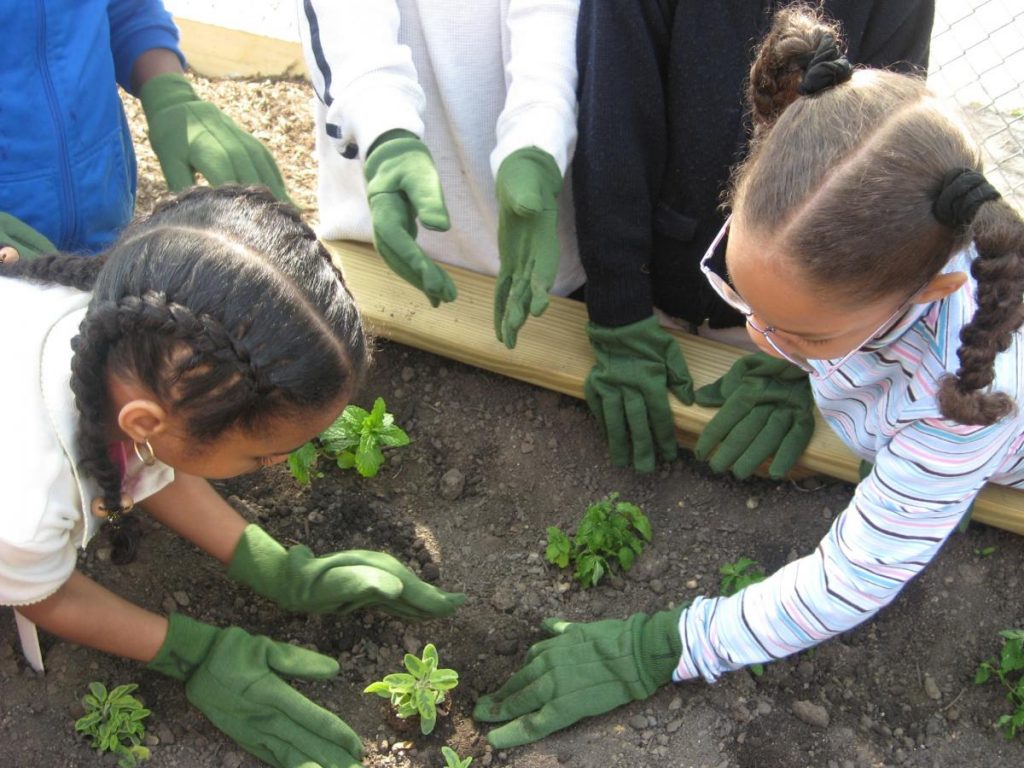An Academic Perspective
Below, I have summarized two peer-reviewed articles by Evan Weissman6 and John Lupinacci7, both of whom view urban school gardens through different critical lenses. These articles demonstrate the nuance and complexity of urban school gardens, both their benefits and also disadvantages.

Picture from isles, a nonprofit community garden in Trenton, NJ: https://isles.org/services/urban-agriculture#.WQoTL8m1tmA
In this class, we have discussed the neoliberal policies that are hindering the success of urban education. After reading a lot of articles about the benefits of urban school gardens, I was surprised to come across Weissman’s article, entitled Entrepreneurial endeavors: (re)producing neoliberalization through urban agriculture youth programming in Brooklyn, New York. How could gardens, which seem like places where kids learn about healthy food, get outside in nature, and participate in physical activity, be reproducing neoliberalization?
Weissman starts his article by acknowledging the benefits of school gardens I have mentioned, but when he gets to the point that gardens teach students between ‘good’ and ‘bad’ food, we are teaching them to link health, fresh and local foods with ‘good’, and processed, cheap, unhealthy foods with ‘bad.’ But what the garden doesn’t do is teach the students about the link between privileged participation in healthy, local, fresh food, and impoverished eating. Many kids who grow up in cities and/or in impoverished areas eat the ‘bad’ foods because the good ones are expensive. Processed, cheap, fast foods are much more accessible to families who can’t afford to buy organic.
Weissman argues that advocates for school gardens push the idea that if kids know about healthy food and healthy food production, they will simply choose to eat them. This reinforces the neoliberal ideology of free market and choice, but doesn’t address the fact that there are barriers to kids and families making that choice. I order for an urban school garden to operate in the best interests of these students, they need to educate about more than just healthy food; schools and communities must become educated on the disparate access to food as well.
Lupinacci, rather than focusing on urban school gardens as a whole, focuses on a particular city, Detroit, and a particular organization in that city, The Detroit Black Community Food Security Network (DBCFSN). He begins his article noting that half a million Detroit residents live in what are called food deserts: places with limited access to fresh healthy food. These food deserts, and their disparate impact on poor communities and communities of color are exactly what Weissman says are problematic, under addressed topics in urban school gardens.
But what Lupinacci finds is that the DBCFSN is combining its political activism, and fight for better food policies, with youth education and gardening. As one leader of the organization said:
“Rather then just complain or lament about our condition, our organization practices self-determination. We think it is important that people themselves stand up and find solutions to our problems. One of the solutions to the lack of access to fresh affordable healthy produce in the city of Detroit is urban agriculture.”7
Food choices and food sovereignty are linked with systems of racism, classism, and sexism. Lupinacci defines the goals of the organization, and we can see how these goals are linked with these larger systems of injustice:
“(1) Educate and promote sustainable, equitable, and culturally appropriate urban agricultural practices
(2) Develop and enforce a local food security policy
(3) Invest in the refocusing education for Detroit’s youth toward knowledge of food sovereignty and their right to live happily and healthily in their local communities.” 7
DBCFSN has urban garden programs in local schools, churches, hospitals and community organizations, because they want people to gain the benefits of gardens (physical activity, knowledge healthy food habits, and increased academic achievement) and also because they want people to take food sovereignty seriously. School gardens, as the DBCFSN sees it, are “experiential sites for learning how to cultivate healthy, culturally appropriate food.”7
The DBCFSN is thus a perfect example of how to incorporate school gardens into a larger community education program about food insecurity and food sovereignty that Weissman calls for. It goes beyond the superficial benefits of school gardens, we must too address systemic issues.
